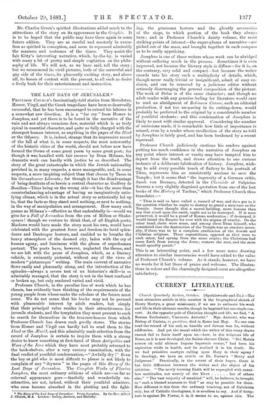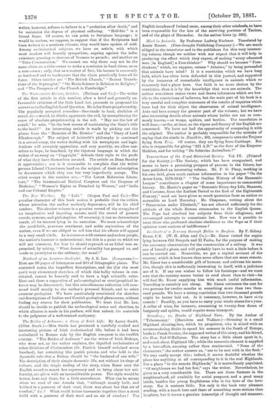CURRENT LITERATURE.
Church Quarterly Review, October. (Spottiswoode and CO—The most attractive article in this number is the biographical sketch of Henry Martyn, a great missionary, if we are to estimate his work and life in their ultimate results, though he baptised but one single con- vert. At the opposite pole of Christian thought and life, we find, "A Roman Ecclesiastic, Vincenzio Anivetti." Mgr. Anivetti, who was Bishop of Carista, in part bus, died in Rome last May. No one can read the record of his end, so humble and devout was he, without edification. And yet the moral which the writer of this essay draws cannot fail to force itself upon ns,—how, in the religious life of Rome, as it is now developed, the Saints obscure Christ. " Dei Mattis nomen sit mihi ultimus linguae loquentis motas," had been his aspiration while in health, and he realised it in his death. Do we find primitive martyrs calling upon Mary in their agony P In theology, we have an article on Dr. Farrar's "Mercy and Judgment." Practically, in the extent of their hopes, there is but little difference between the writer and the object of his criticism. "The newly teeming Earth will be repeopled with of others multitudes, not merely of the Elect ing.
also." "The vast majority of mankind " will, he believes, be brought to "such a blessed nearness to God" as may be possible for them. How different is this from the ordinary teaching, not of Calvinists only, but of Catholic theologians, it is needless to say. And if Scrip- ture is against Dr. Farrar, it is, it seems to us, against this. The 'writer, however, refuses to believe in a "probation after death," and he maintains the dogma of physical suffering. " Hell-fire " is a literal flame. Of course, he can point to Scripture language ; it would be useless, we suppose, to suggest that if the Scriptures had been written in a northern climate, they would have spoken of cold. Among ecclesiastical subjects, we have an article, with which most readers will heartily sympathise, arguing against the indis- criminate granting to deacons of licences to preach; and another on "Tithe Commutation." We cannot see why there may not be the same claim on a tithe-owner to make a remission in hard times, as on a rent-owner ; only, that as a matter of fact, his income is commonly so burdened and so inadequate that the claim practically loses all its force. Other articles are "The British Church," "Recent Transla- tions of the Septuagint," "On Brain Science in Relation to Religion," and "The Prospects of the Church in Cambridge."



































 Previous page
Previous page